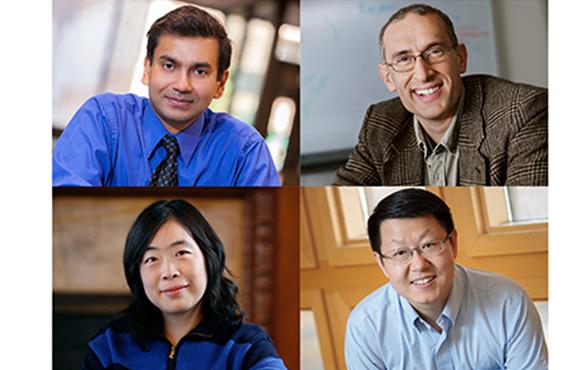Four McKelvey Engineering faculty receive LEAP awards
Four faculty members in the McKelvey School of Engineering recently received awards to prepare their products for commercialization

Four McKelvey School of Engineering faculty members received awards from the Skandalaris Center's Leadership and Entrepreneurial Acceleration Program (LEAP).
The LEAP Awards support Washington University faculty developing a product or innovation and provide industry connections and gap funding to stimulate Washington University technology commercialization, illuminate investment risk and rapidly accelerate development of validated projects.
Out of 25 teams that entered, 10 received awards supported by funding from the Institute of Clinical and Translational Sciences, Siteman Cancer Center, Skandalaris Center for Interdisciplinary Innovation and Entrepreneurship, McKelvey School of Engineering, and Center for Drug Discovery.
The McKelvey Engineering faculty who received awards are:
- Shantanu Chakrabartty, professor of electrical & systems engineering, with Joe Beggs, an undergraduate student; Yarub Alazzawi, a doctoral student; and Kenji Aono, a postdoctoral research associate, for a project titled "SelfCap, self-capacitance based wireless powering technology that improves the aesthetic value and user compliance of wearables and semi-invasive biosensors by reducing its form-factor and battery requirements.
- Guy Genin, professor of mechanical engineering & materials science, with John M. Felder, assistant professor of surgery at the School of Medicine, for a project titled "Barbed Mesh for Sutureless Tissue Fixation, a mesh that can be used for fixating tissues, such as abdominal fascia, and skin, that eliminates the need for traditional suturing and saves OR time."
- Lan Yang, professor of electrical & systems engineering, with Jie Liao, a doctoral student; and Abraham J. Qavi, a postdoctoral research associate, for a project titled "Seeing Sound: Redefining Hear Aids Through Light, optical sensors that will drastically improve the performance of hearing aids.
- Chao Zhou, associate professor of biomedical engineering, with Rajendra Apte, MD, PhD, the Paul A. Cibis Distinguished Professor of Ophthalmology and Visual Sciences at the School of Medicine, and Jason Jerwick, a doctoral student in biomedical engineering, for a project titled "Ultrahigh speed optical coherence tomography, a novel, patented technology that offers over 10x speed improvement in eye scans while being compatible/ retrofit-able with tens of thousands of OCT devices in the market."
Click on the topics below for more stories in those areas
- Entrepreneurship
- Brief
- The Institute of Materials Science & Engineering
- Electrical & Systems Engineering
- Mechanical Engineering & Materials Science
- Biomedical Engineering







